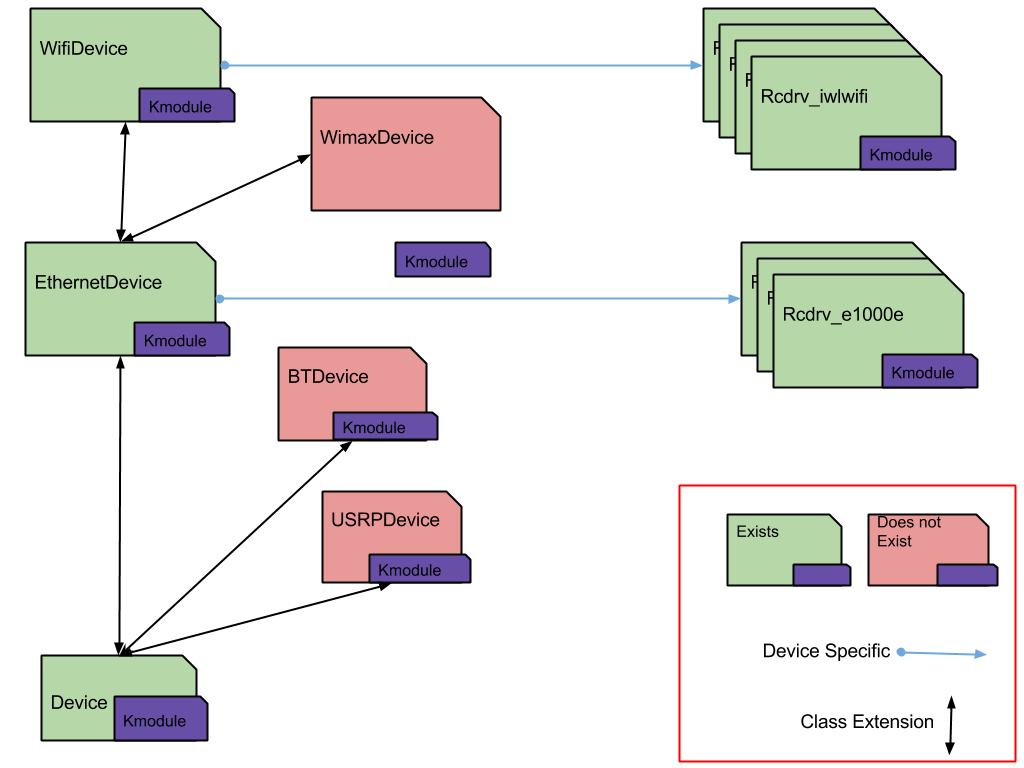| Version 4 (modified by , 11 years ago) ( diff ) |
|---|
Rebuilding the Node Agent from the ground up
Dependencies: omfcommon/Mobject
gems: cocaine yaml?
Design Notes:
kmodule.rb Moving all the functionality of module handling into a separate class. There may be a need to have drivers load multiple modules. Additionally the module class needs to keep track of how many devices are using one module (as there may be many to one). The unload method should only unload if the last reference asks it to (all other references have de-registered).
nodeagent.rb:
The hwdiscovery mode of the nodeagent code is being re-done. Instead of the original grep lspci lines, we now have has of dev_id's. Each dev_id in the hash maps to a node agent device driver that will be loaded to handle that specific device. This device will load the module for it's respective device type.
devices.rb
We're implementing all the module handeling code here. It uses the cocaine command line library as a wrapper. The cocaine lib kicks out an exception if the command fails. Exception handling will mitigate failed commands.
ethernet.rb
This class is responsible for all of the ifconfig/route handling code (all things ethernet). The same cocaine lib will handle shell commands with similar exception handeling. The interface has been extended to implement getters and setters for all the requisite interface state (ip, netmask, etc…). We've left the original get config command structure alone, but now also have implemented an execConfigCmd which will actually implement these config commands.
wifi.rb
TODO
rcDrv_e1000e.rb e1000e kernel module specif driver. A child of ethernet. Overides any thing that is specific to e1000e, but mostly leaves the parent class in tact. Also sets the value of @kmodName
More to follow
.
.
.
Driver Inheretance Chain
Observations:
9/1/2014
- active? is defined at "Ready to be configured". If a device is set to active, it is read to accept config commands.
- Activation should check if the module is loaded before loading it.
- All devices will not know their device name during creation (default is nil). All dev_driver classes will be instantiated at startup, however none of them will be activated (with the exception of eth1). When a device need to be used. It will have to be activated. Once activated (that is once the module is loaded) the agent will give names to the respective objects now that they have been created. This is essentially how the logical names are bound to the dev names (a logic managed by the agent, not the dev).
9/1/2014
- It may be necissary to have multiple driver modules for a single device. The recurrent case is the iwldvm module. It gets loaded if we load iwlwifi but it depends on iwlwifi. Thus when you load iwlwifi, you can not unload it with out first unloading iwldvm. Because iwlwifi and athXk both depend on cfg802, when the iwldvm module is unloaded with modprobe -r iwldvm, iwlwifi is not unloaded.
Attachments (9)
-
Resource Controller Device Driver Diagram.png
(40.7 KB
) - added by 11 years ago.
RC driver inheritance Chain
-
NodeAgent - UML.2.png
(239.8 KB
) - added by 11 years ago.
Updated UML with public method highlighting
- HwDiscover - New Page.png (42.9 KB ) - added by 11 years ago.
-
ConfigureConnect - New Page.2.png
(50.4 KB
) - added by 11 years ago.
Connect Configure Flow
-
ConfigureConnect - New Page.png
(50.4 KB
) - added by 11 years ago.
Connect Configure Flow
-
NodeAgentStartup - Program Flow.png
(124.4 KB
) - added by 11 years ago.
Flow of node Agent startup
-
Connect Flow - 3 state.png
(161.4 KB
) - added by 11 years ago.
Start logic
-
Configure Flow - 2 State.png
(117.7 KB
) - added by 11 years ago.
The decision flow of the configure command
-
NodeAgent - UML.png
(267.3 KB
) - added by 11 years ago.
Updated nodeagent UML for wimax
Download all attachments as: .zip

